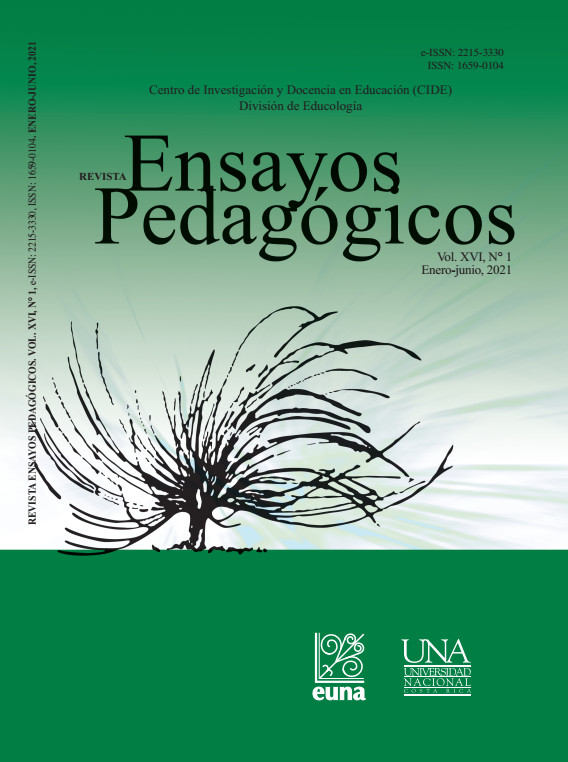Theatrical Pedagogy and Anti-Behaviorism, A Teaching and Learning Experience in the Indigenous Community of Amubri
DOI:
https://doi.org/10.15359/rep.16-1.7Keywords:
education, theater, social learning, dramatic play, indigenous communities, motivation, indoctrination, liberation, peaceAbstract
A current sector of the education in Costa Rica could be compared to the disease of “bulimia” in which students memorize -ingest- concepts and then transcribe -regurgitate them- in a written test, thereby generating purely rote and behavioral learning The most dangerous part about this is that an “educational pathology” is being created in the student body. The promotion of criticism and motivation to go to classroom spaces and the significance of learning no longer have room in a neoliberal system, which fosters mastery of basic concepts and submissive labor. This essay aims to propose the tool of dramatic play through a classroom systematization in the area of Social Studies to undermine the situation of rote learning in addition to the use of sociocultural learning of Lev Vygotsky and Theater Pedagogy as theoretical support, which promote learning contextualized in the culture where the student is immersed in a liberation of the mind and educational motivation. This is done to build more meaningful learning not only for students but also for them to transmit it to the people around them, generating social learning, a task that is urgent in our current society.
References
Baquero, R. (2009). Zona de desarrollo próximo, sujeto y situación: El problema de las unidades de análisis en psicología educativa. Revista Actualidades Investigativas en Educación, 9(número especial), 1-25. doi: 10.15517/AIE.V9I4.9514
Camargo, M., Calvo, G., Franco, M. C., Vergara, M., Londoño, S., Zapata, F. y Garavito, C. (2004). Las necesidades de formación permanente del docente. Educación y Educadores, 7, 79-112. Recuperado de https://educacionyeducadores.unisabana.edu.co/index.php/eye/article/view/550/643
Chaves, A. L. (2011). Implicaciones educativas de la teoría sociocultural de Vygotsky. Revista Educación, 25(2), 59-65. doi: 10.15517/REVEDU.V25I2.3581
D’Antoni, M. Gómez, J., Gómez, L. y Soto, J. F. (2012). La escuela en cuestionamiento: Diálogos sobre la resistencia escolar en procesos pedagógicos emergentes. San José: Editorial Arlekin.
Freire, P. (2003). El grito manso. Buenos Aires: Siglo XXI Editores.
Freire, P. (2012). Pedagogía de la autonomía: Saberes necesarios para la práctica educativa. Buenos Aires: Siglo Veintiuno.
García-Huidobro, V. (1996). Manual de pedagogía teatral. Santiago: Editorial Los Andes. Recuperado de http://www.memoriachilena.gob.cl/archivos2/pdfs/MC0050907.pdf
Hillert, F., Ouviña, H., Rigal, L. y Suárez, D. (2011). Gramsci y la educación: Pedagogía de la praxis y políticas culturales en América Latina (Prólogo de Moacir Gadotti). Buenos Aires: Noveduc.
Matos, R., Pineda, Y. y Vásquez, A. (2010). El aprendizaje del arte. Un modelo de mediación basado en la interacción sociocultural. Revista de Investigación, 69, 179-207. Recuperado de https://www.redalyc.org/pdf/3761/376140384008.pdf
Programa Estado de la Nación. (2013). Cuarto Informe Estado de la Educación. San José: Editorama. Recuperado de http://repositorio.conare.ac.cr/bitstream/handle/20.500.12337/672/Estado%20de%20la%20Educaci%c3%b3n%204.pdf?sequence=22&isAllowed=y
Vygotsky, L. (2000). Obras escogidas III: Historia del desarrollo de las funciones psíquicas superiores 1931. Madrid: Visor Dis.
Published
How to Cite
Issue
Section
License
Ensayos Pedagógicos is subscribed to the Attribution-NonCommertial-NoDerivatives 4.0 International Creative Commons Licence, which allows both authors and readers to freely download, store, copy, and distribute the final approved publisehd version of the manuscript (post-print) as long as this is done without commercial purposes, no derivative works are generated, and the source and author are mentioned. As well, Ensayos Pedagógicos declares that authors will remain the rightful owners of the copyrights of their work in perpetuity.







